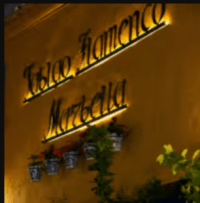Miguel Poveda
Miguel Poveda is a young revelation that performs the more orthodox styles of cante flamenco. Although not born on Andalucian soil, he is one of the most promising and talented young singer around at the moment.
Many people believe that you have to have been born in Andalucia to perform authentic flamenco. Many of these people also believe that you have to be of gypsy blood, another qualification in the list of musts for a genuine flamenco performer. But as the history of this art will show, every now and then some one appears and shows that these beliefs are unfounded. Even though it is a fact that the majority of good genuine artistes are of gypsy lineage who were born in the lower villages of Andalucia, names like Carmen Amaya and Paco de Lucía are a reminder that flamenco is not strictly only andalucian or solely a sediment found only in gypsy blood.
Without scripts or structured compositions, the Flamenco artists let themselves be carried away by improvisation and the passion of flamenco. Witness dancing and singing, where the a cappella voice, the guitar chords and the rhythm of the dancers will fill the stage. Dining optional. Tickets for Flamenco Show at Tablao Flamenco in Marbella.
One of these artistes is a young non-gypsy by the name of Miguel Ängel Poveda León, born in Badalona, Barcelona in 1973.
Miguel Poveda is one of the most talented young flamenco singers around at the moment and although he has no artistic predecessors in his family, he has become something of a revelation. He has knowledge and expertise with the more orthodox styles of singing, especially the styles connected to Jerez de la Frontera.
Miguel Poveda started to sing at the age of fifteen as an accompanist to his sister, a dancer by the name of Sonia Poveda, but it was to be another few years before he was to receive the recognition that he so deserved.
In 1993 Miguel Poveda scooped four major awards at the La Union Cante de las Minas Festival, something last achieved by the veteran singer Fosforito in 1956. One of these awards was the coveted Lampa Minera Trophy, and since then his career has reached heights that most can only dream of.
In 1995 he recorded his first disc by the title of Viento del Este which was a collection of traditional flamenco songs, but with the fresh approach of a young Catalan singer who has all the knowledge and qualities as his andalucian counterparts.
His appearance in the film La teta y la luna by Juan José Bigas Luna was to help his career even more and soon he was appearing at many of the major flamenco festivals, including the Bienal de Flamenco in Seville.
In 1997 he produced a show based on the works of the poets of the Generation of 1927; using the words of these poets he went on to tour Europe and as far away as Mexico and Japan.
1999 saw the release of his second Cd, Suena Flamenca with which he stayed faithful to the flamenco tradition with a collection of songs that included soleares, buleria, tango and alegria. This Cd also contained a heart felt tribute to the legend of Manolo Caracol.
By this period, Miguel Poveda was making sure his name would be amongst the top cantaores of the period, and the fact that he was an outsider, so to speak, gave his art an extra special quality.
Miguel Poveda has always had a strong affection for the cantes of Jerez de la Frontera and his third Cd, Zaguan not only contained songs synonymous with this gypsy area but also some of Jerez’s top artistes including guitarist Moraito and singer El Zambo who both participated on the Cd.
But Miguel Poveda was determined to show that there were more strings to his bow than flamenco and in 2004 he made a live recording called Poemas de Exilo. Rafael Alberti. The show was based on the works of Alberti whose work consisted of poems about his war torn country, many of which were written whilst Alberti was in exile in South America.
The following year he recorded another unflamenco Cd by the name of Desglac, which was a collection of Catalonian songs which showed that this young singer is versatile and adaptable to music other than just flamenco.
In 2006 he returned to the flamenco tradition with the Cd Tierra de Calma, which again included a collection of the finest flamenco performers including Moraito on guitar and Diego Carrasco, with whom Miguel performs a buleria full of the joyfulness of gypsy flamenco. This recording also had the piano work of Dorantes, a young flamenco pianist who is the son of Pedro Pena, the renown guitarist from Lebria.
His fascination with the styles of Jerez de la Frontera is reproduced in his latest show by the name of Sin Fronteras in which the fiesta atmosphere of the 70`s festival are recreated. Amongst clouds of cigarette smoke and stomping rhythms Miguel Poveda is accompanied by the excellent guitar of Moraito, the voice of El Zambo and the dance of Joaquin Grillo three of Jerez de la Fronteras most respected artistes.
The voice of Miguel Poveda possesses all the antique qualities of El Zambo and his command of the rhythm and his natural charisma show that this young singer has the quality and knowledge of flamenco possessed by only a few of today’s younger performers.
Miguel Poveda is definitely one of today’s most prestigious artistes and the likes of him will make certain that flamenco music will survive well into the twenty-first century.
Recommended listening
Viento del este 1995
Suena flamenco 1998
Tierra de Calma 2006
